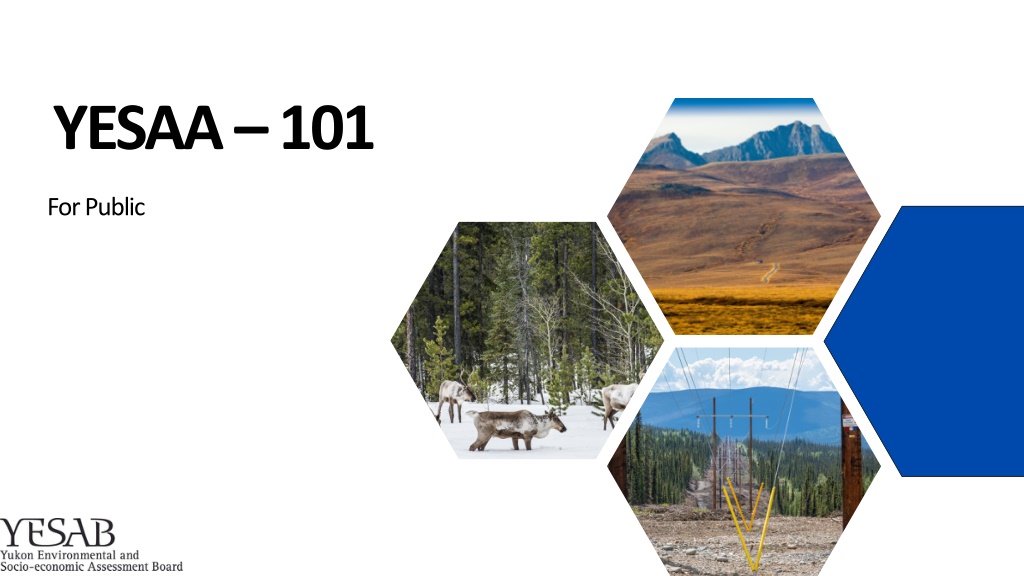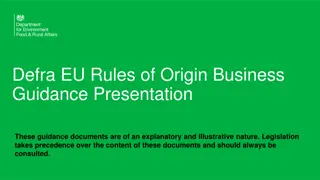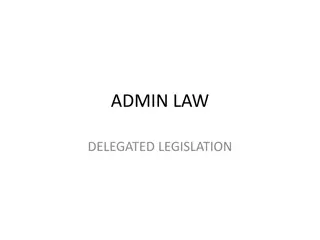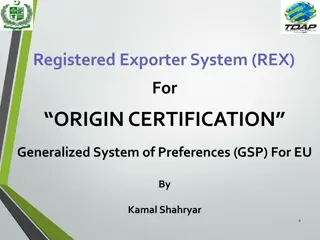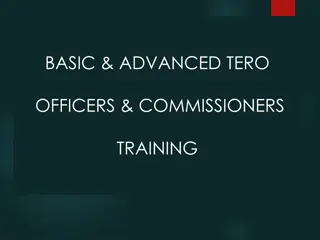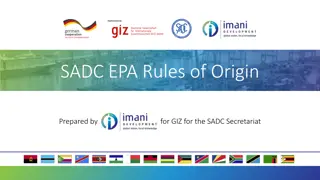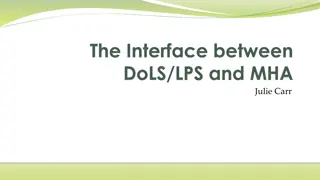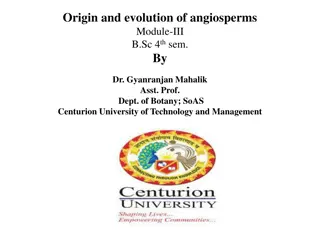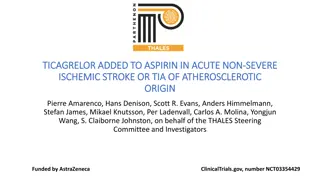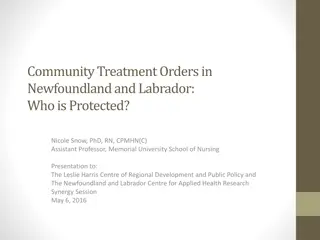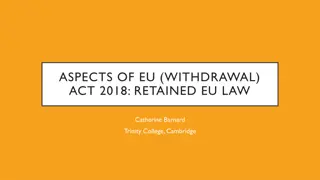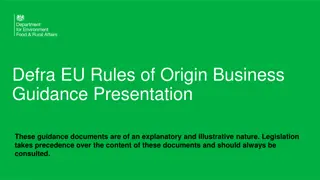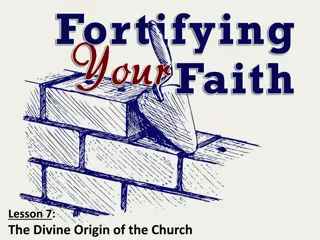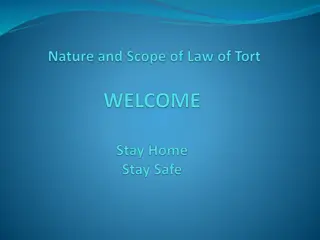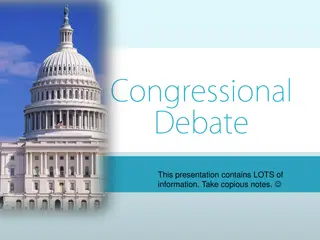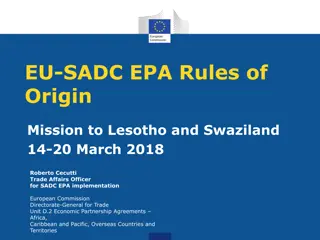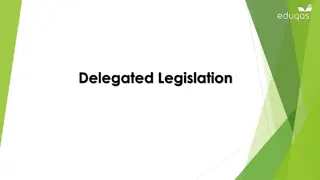Understanding the Purpose and Origin of YESAA Legislation
YESAA, the Yukon Environmental and Socio-economic Assessment Act, was developed in collaboration with Yukon First Nations to ensure environmentally and socially responsible project assessments. The Act, passed in 2003, aims to protect environmental quality, heritage resources, and the well-being of Yukon communities. It also emphasizes promoting beneficial socio-economic change while respecting ecological systems. YESAA is unique in that it recognizes and enhances the traditional economy of Yukon First Nations. The legislation establishes the Yukon Environmental and Socio-Economic Assessment Board (YESAB) to carry out assessments independently.
Download Presentation

Please find below an Image/Link to download the presentation.
The content on the website is provided AS IS for your information and personal use only. It may not be sold, licensed, or shared on other websites without obtaining consent from the author. Download presentation by click this link. If you encounter any issues during the download, it is possible that the publisher has removed the file from their server.
E N D
Presentation Transcript
YESAA 101 For Public
YESAA and its Origin YESAA stands for the Yukon Environmental and Socio-economic Assessment Act . It was passed on May 13, 2003 and came into effect on November 28, 2005. YESAA was developed as a requirement under the Development Assessment chapter (12) of the Umbrella Final Agreement (UFA) and each Yukon First Nation s Final Agreement. The Council of Yukon First Nations (CYFN), Canada and the Government of Yukon (the Parties) crafted the legislation and regulations together. The CYFN relied on input from all Yukon First Nations. YESAA is a made-in-Yukon law, designed to meet the needs of Yukon First Nations and Yukoners. It is unlike other assessment legislation throughout Canada because it is guided by specific Treaty objectives. YESAA establishes the Yukon Environmental and Socio-Economic Assessment Board (YESAB) as an independent, arms-length body that is responsible for carrying out environmental and socio-economic assessments.
YESAA: A federal legislation YESAA is federal legislation that applies in the Yukon. In 1993, the UFA was signed by the Parties (Canada, Yukon and CYFN). It required Government to create development assessment legislation. (UFA s.12.3.0). The UFA defined Government to mean Canada or the Yukon, or both, depending on which government or governments have responsibility, from time to time, for the matter in question . Chapter 12 of UFA Development Assessment sets out the process for conducting environmental and socio-economic assessments of projects before they occur. In 1993 only Canada had responsibility to conduct environmental assessments in the Yukon under the Canadian Environmental Assessment Act (CEAA). The Parties negotiated the Yukon Environmental & Socio- economic Assessment Act (YESAA) and it was passed by Parliament in May 2003.The Act replaced the Canadian Environmental Assessment Act in the Yukon.
Purpose of YESAA The purpose of YESAA as set out in section 2 of the Act: a) To provide a comprehensive, neutrally conducted assessment process applicable in Yukon; b) To require that, before projects are undertaken, their environmental and socio-economic effects be considered; c) To protect and maintain environmental quality and heritage resources; d) To protect and promote the well-being of Yukon First Nations persons and their societies and Yukon residents generally, as well as the interests of other Canadians; e) To ensure that projects are undertaken in accordance with principles that foster beneficial socio-economic change without undermining the ecological and social systems on which communities and their residents, and societies in general, depend.
Purpose of YESAA f) To recognize and, to the extent practicable, enhance the traditional economy of Yukon First Nations persons and their special relationship with the wilderness environment; g) To guarantee opportunities for the participation of Yukon First Nations persons and make use of their knowledge and experience in the assessment process; h) To provide opportunities for public participation in the assessment process i) To ensure that the assessment process is conducted in a timely, efficient and effective manner that avoids duplication; and j) To provide certainty to the extent practicable with respect to assessment procedures, including information requirements, time limits and costs to participants.
Rules and regulations The Act has 2 accompanying regulations: 1. Assessable Activities, Exceptions and Executive Committee Projects Regulations 2. Decision Body Time Periods and Consultation Regulations The UFA and YESAA set out the assessment process at a high level. This process is further specified in Rules established by the Board. There are three sets of Board Rules: Designated Office Evaluations Executive Committee Screenings Panel Reviews by the Board
Three levels of assessment Regional Designated Office Evaluations The majority of assessments (%) are done in regional, community-based offices. Head Office Executive Committee Screenings The Executive Committee of the Board assesses larger projects that come to it directly, or are referred by a Designated Office. Board Level Panel Reviews Panels of the Board are established to assess projects that may cause major public concern and are referred to it by the Executive Committee.
What triggers an assessment? Activities that require an assessment are set out in the Assessable Activities Regulation. Part 2- Industrial Activities Part 3- Oil & Natural Gas Part 1- Mining The regulation has 3 Schedules: Part 4- Energy & Telecommunications Part 6- Part 5- Wildlife Transportation -Schedule 1: Activities and Specific Exceptions for Designated Office assessments -Schedule 2: General Exceptions -Schedule 3: Activities for Executive Committee Screenings Part 7- Nuclear Facilities & Substances Part 8- Part 9- Water Contaminants Part 12- National Parks and Historic Sites Part 11- Air emissions Schedule 1 has 13 Parts which set out specific activities and exceptions. (see table) Part 10- Fisheries Part 13- Miscellaneous
What triggers an Assessment? An assessment is required when the conditions of s.47(2) of the Act are met: An activity that is listed in the regulation, and is not excepted, is subject to assessment if proposed to be undertaken in Yukon and if, a)A federal agency is the proponent; b)A territorial agency, municipal government, or first nation is the proponent and an authorization or the grant of an interest in land would be required for the activity to be undertaken by a private individual; c)An authorization or the grant of an interest in land by a government agency, municipal government of first nation is required for the activity to be undertaken; or d)An authorization by the Governor in Council is required for the activity to be undertaken.
Matters to be Considered There are specific matters to be considered in an assessment as set out section 42(1) of the Act: In conducting an assessment of a project, a designated office, the executive committee or a panel of the Board shall take the following matters into consideration: a)The purpose of the project; b)All stages of the project; c)The significance of any environmental or socio-economic effects of the project that have occurred or might occur in or outside the Yukon, including the effects of malfunctions or accidents; d)The significance of any adverse cumulative environmental or socio- economic effects that have occurred or might occur in connection with the project in combination with the effects of other projects for which proposals have been submitted or any activities that have been carried out, are being carried out or are likely to be carried out in or outside the Yukon d.1) Any studies or research undertaken under s.112(1) that are relevant to the project; d.2) the need for effects monitoring;
YESAA- Consultation Consultation is defined in s.3 of YESAA Where, in relation to any matter, a reference is made in this Act to consultation, the duty to consult shall be exercised a)By providing, to the party to be consulted, i.Notice of the matter in sufficient form and detail to allow the party to prepare its own views on the matter, ii.A reasonable period for the party to prepare its views, and iii.An opportunity to present its views to the party having the duty to consult; and b)By considering, fully and fairly, any view so presented.
YESAA- Consultation Proponent obligation to consult potentially affected FNs and community residents prior to the screening is set out in YESAA (s50(3)). Crown (federal and territorial governments) has a separate and distinct constitutional duty to consult affected First Nations on projects. Federal and territorial governments may choose to rely on the YESAA process to fulfill elements of their constitutional duty to consult with First Nations. YESAB Neither YESAB or the EC, has the duty or authority to conduct consultation with First Nations affected by a proposed project.
Assessment Timelines & Reports The timelines of assessments are subject to Board rules and can be extended depending on nature of the project and requests for more time from participants. Current project statistics with timelines are available at yesabregistry.ca/statistics The assessment and YESAB s recommendation is contained in a report as below: Designated Office Evaluation Report Executive Committee Screening Report Panel of the Board Panel Report
Assessment Decision -- Governments Decision Maker (called Decision Bodies) - YG, FN or Canada (government) must Accept, Vary, or Reject Assessment Recommendation in a public decision document Reasons must be given if varied or rejected
For more information, visit: Website: www.yesab.ca YESAB Online Registry : www.yesabregistry.ca Call: 668-6420 Toll Free:1-866-322-4040 Fax:867-668-6425 Email:yesab@yesab.ca
